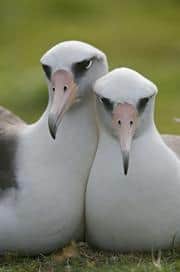Two studies have been released today, both of which relate to homosexuality in the animal world.
After researchers in South Korea deleted a gene from a female mouse, said mouse immediately went off with other female mice.
AOL News explains what this might mean:
"We speculate that these behavioral changes are likely to be related to a neuro-developmental change in pre-optic area of the female mutant brain, becoming similar to that of a normal male," Professor Chankyu Park, of the Korea Advanced Institute of Science and Technology, told UPI.
In particular, removing the gene exposes the brain to extra estrogen, which is responsible for masculinity in mice. In humans, testosterone does similar things.
 And in the journal Nature, a study about evolution, parenting and birds:
And in the journal Nature, a study about evolution, parenting and birds:
"Biologists had thought that homosexuality is disadvantageous on an evolutionary level because it distracts animals from pursuing sexual encounters that could result in offspring. Yet more than 130 species of birds participate in homosexual activity — and sometimes a lot of it. In the Laysan albatross (Phoebastria immutabilis), for example, up to 31% of pairs are female–female in some populations, and up to 20% of pairings in graylag geese (Anser anser) are male–male. Scientists have struggled to explain such patterns."
"But homosexuality may not be costly for birds that have plenty of mating opportunities because of lower parenting demands, says Geoff MacFarlane, an ecologist at the University of Newcastle in Callaghan, Australia. The less effort that females or males put into parental care, the more they participate in homosexual activities, according to a survey of the literature his team published this week in the journal Animal Behaviour."
Some gay birds make the best parents. Remember these two?



